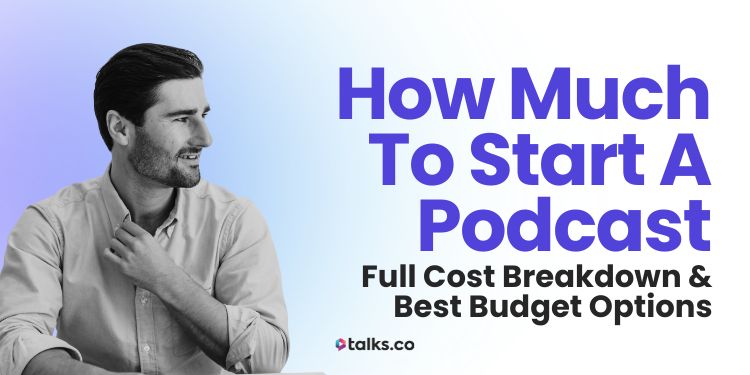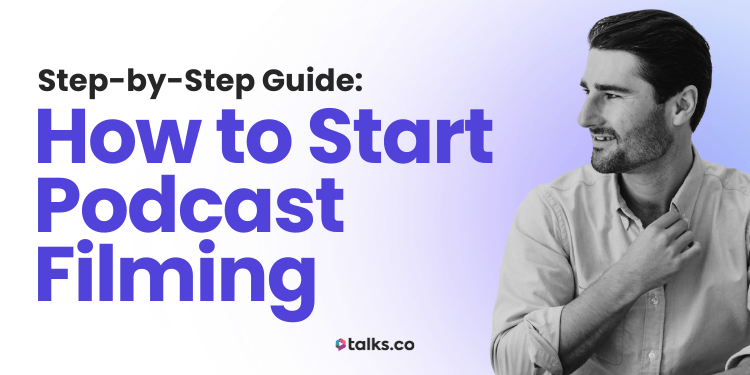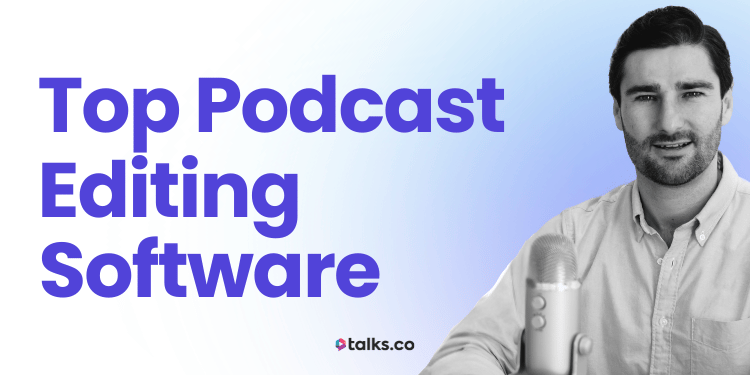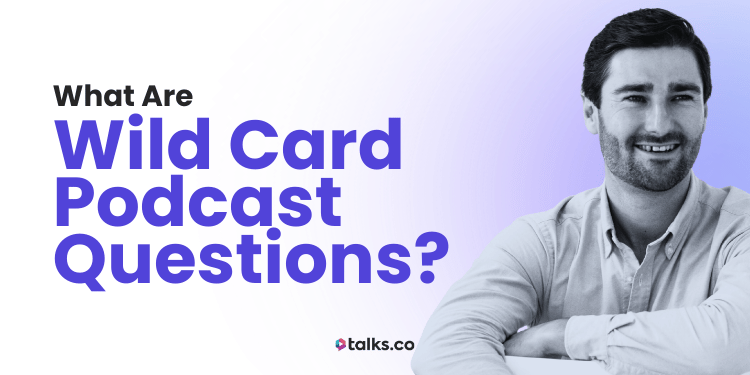Thinking about starting a podcast but unsure about how much to start a podcast? Do you need high-quality equipment, or can you do it for free?
Good news – you don’t need to spend a fortune on podcast production. Whether you’re launching as a hobby podcast or building a professional video podcast, there’s a podcaster setup that fits your budget.
This guide breaks down the real costs of podcasting, from budget-friendly options to high-end setups. You’ll see cost breakdowns for different budgets (low, mid, high), real-life equipment setups, and smart ways to save money without sacrificing quality.
By the end, you’ll learn how to start your own podcast, know where to spend, where to save, and how to get your podcast started without overspending. Let’s start.
How Much Does It Cost to Start a Podcast?
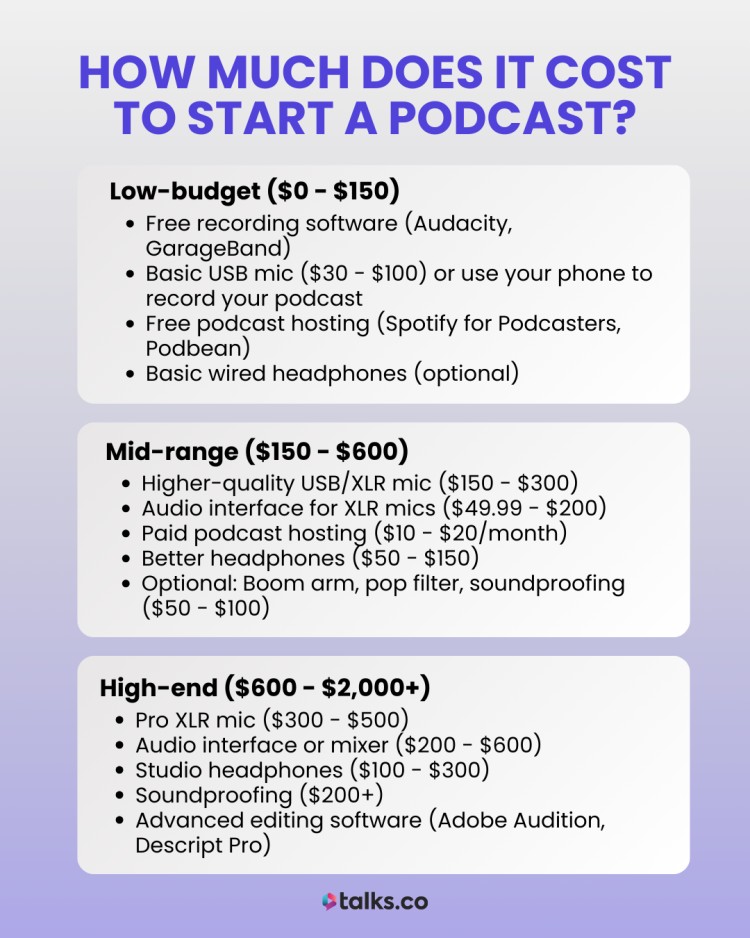
The cost of starting a professional podcast depends on your budget and goals. You can launch one for free or invest in professional-grade equipment and the best software for podcast interviews.
Costs can vary widely to start a podcast and make money. Here’s a breakdown of three budget levels to help you decide:
Low-budget ($0 – $150)
- Free recording software (Audacity, GarageBand)
- Basic USB mic ($30 – $100) or use your phone to record your podcast
- Free podcast hosting (Spotify for Podcasters, Podbean)
- Basic wired headphones (optional)
Mid-range ($150 – $600)
- Higher-quality USB/XLR mic ($150 – $300)
- Audio interface for XLR mics ($49.99 – $200)
- Paid podcast hosting ($10 – $20/month)
- Better headphones ($50 – $150)
- Optional: Boom arm, pop filter, soundproofing ($50 – $100)
High-end ($600 – $2,000+)
- Pro XLR mic ($300 – $500)
- Audio interface or mixer ($200 – $600)
- Studio headphones ($100 – $300)
- Soundproofing ($200+)
- Advanced editing software (Adobe Audition, Descript Pro)
Start with the basics and upgrade as needed. Spend where it matters, save where you can.
How Much Does Podcast Equipment Cost?
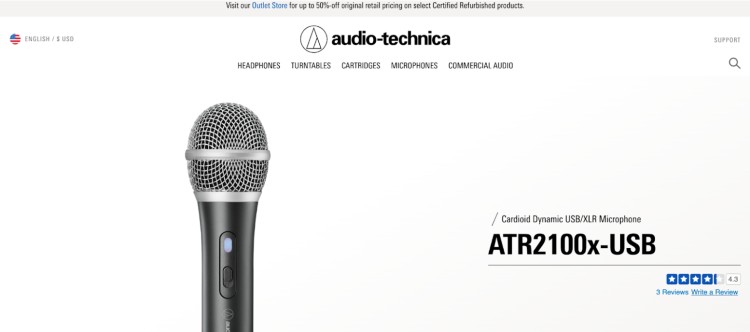
Your microphone is the most important piece of podcasting equipment, but you don’t need to spend a fortune. Here’s a breakdown of essential gear at different price points and estimated costs.
- Budget podcast microphones ($50 – $150): USB mics like Audio-Technica ATR2100x or Samson Q2U offer plug-and-play ease with good quality.
- Mid-range microphones ($150 – $300): XLR mics like Rode PodMic or Shure SM58 provide better sound but require an audio interface for podcast recording.
- Professional microphones ($300 – $500+): Studio-quality options like Shure SM7B or Electro-Voice RE20 require an interface.
- Audio interfaces ($100 – $300): Needed for XLR mics, with popular choices like Focusrite Scarlett 2i2.
- Mixers ($600+): Useful for multi-person podcast episode recordings, with models like the Rodecaster Pro II.
- Headphones ($50 – $300): Options like Audio-Technica ATH-M20x ($49) or Sony MDR-7506 ($99.99) help monitor sound quality.
- Pop filters ($2.75 – $39.99): Reduce harsh “P” and “B” sounds for cleaner audio.
- Boom arms/mic stands ($15 – $200): Keep your mic stable and improve comfort while recording your podcast episode.
- Soundproofing ($50 – $500): DIY solutions like blankets and rugs or foam panels improve acoustics.
Best approach: Start with a USB mic and upgrade to a podcast equipment bundle you need over time.
How Much Does It Cost to Set Up a Podcast?
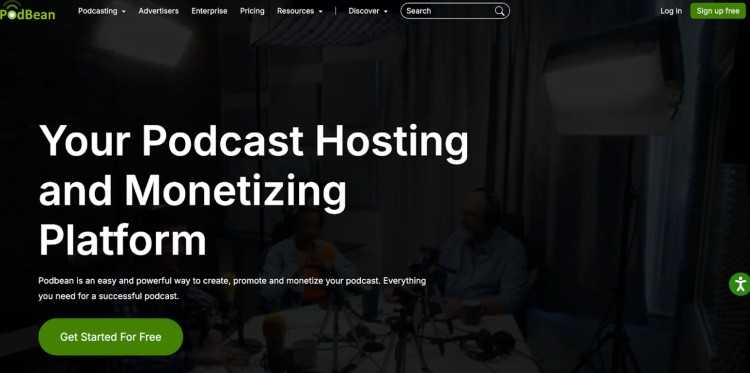
Beyond equipment, setting up a podcast involves software, hosting, and branding. The good news? Some tools are free and still meet your needs as a podcast creator, while others are worth paying for.
Here’s everything you need to know about how much podcasting is going to cost:
- Free editing software: Audacity (PC/Mac) and GarageBand (Mac) offer solid editing tools at no cost.
- Paid editing software ($12 – $95/month): Adobe Audition, Descript, and Hindenburg Journalist provide more control and faster editing.
- Free hosting: Spotify for Creators and Podbean are the best podcast hosting platforms with free plans that offer basic hosting with limited analytics.
- Paid hosting ($5 – $30/month): Buzzsprout, Libsyn, and Captivate provide better analytics, storage, and let you monetize your podcast.
- Cover art ($5 – $100): DIY with Canva or hire a designer on Fiverr or Upwork.
- Intro and outro music ($0 – $50): Free options on Pixabay or premium tracks from sites like PremiumBeat.
- Website and domain ($10 – $200): A basic WordPress site with a custom domain ($10 – $15/year) adds credibility.
- Marketing tools ($0 – $50/month): Headliner for audiograms and Buffer for scheduling to help promote your podcast.
Best approach: Use free tools to start, upgrade hosting and software when you need to invest in more features, and focus on video and audio branding that helps you stand out.
How Much Does It Cost to Produce a Podcast?
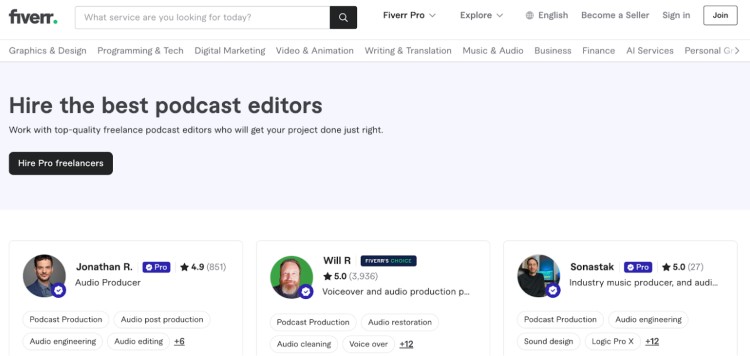
Still wondering how much does podcasting cost? Once your podcast is set up, and you already have a computer, the cost of podcasting production comes down to editing, time investment, and promotion. Whether you handle everything yourself or outsource tasks, here’s what to expect.
- DIY editing (free – $20/month): Use Audacity or GarageBand for free or Descript for AI-powered transcription and editing ($12 – $24/month).
- Hiring a podcast editor ($50 – $500 per episode): They’ll take care of the heavy lifting and make sure you’re focused on hosting a podcast. Basic edits cost $50 – $100, advanced editing with music and sound effects runs $200 – $500, and monthly packages range from $500 – $1,500.
- Time per episode: Planning (30 – 60 min), recording (30 – 90 min), editing (2 – 4 hours), show notes/uploading (30 – 60 min), and promotion (1 – 3 hours).
- Free promotion: Many podcasters share their podcast on social media, email lists, and podcast hosting services and podcast directories, use Headliner for short promo videos, and cross-promote with other podcasters.
- Paid promotion ($50 – $1,000+ per month): Facebook/Instagram ads ($5 – $50 per day), sponsored placements in newsletters ($100 – $500 per ad), and PR or podcast guesting services ($500 – $2,000 per campaign).
Best approach: It’s possible to start a podcast with DIY editing and organic promotion. Invest in paid ads or hire help as you grow your podcast and make money from your podcast.
How Much to Set Up a Podcast Studio?
Your recording space affects sound quality, but you don’t need a professional studio. A quiet room and simple soundproofing can make a big difference.
- Budget-friendly sound fixes: Use a quiet space, blankets, curtains, and soft furniture to reduce echo.
- Low-cost upgrades: Foam panels ($50 – $200), portable vocal booth ($50 – $300), dynamic mic ($100 – $400) for better noise control.
- DIY soundproofing: Record in a closet, hang moving blankets, or use a reflection filter for better acoustics.
- Advanced soundproofing: Acoustic foam panels ($50 – $200), bass traps ($50 – $150), or a DIY vocal booth ($50 – $100).
Best approach: If you’re wondering how to record a podcast, most podcasters record at home. Start with DIY soundproofing before upgrading. You can even record your podcast interviews remotely.
How to Start a Podcast for Free
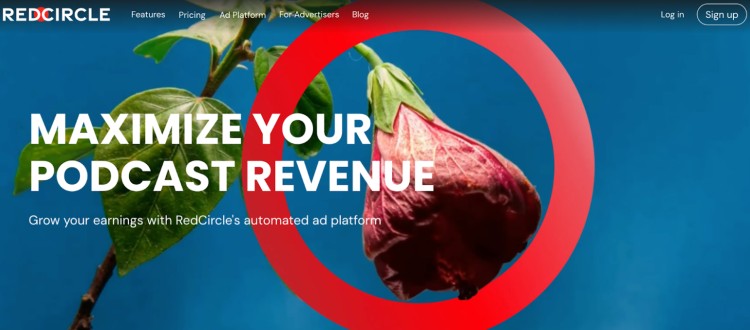
You don’t need a big budget to create a podcast. Free tools exist for recording, editing, hosting, and promotion. The key is knowing where to find them and how to use them effectively.
- Free recording and editing software: Audacity (PC/Mac), GarageBand (Mac), Spotify for Podcasters (mobile).
- Free hosting platforms: Spotify for Creators (unlimited but limited analytics), Podbean (5-hour storage), RedCircle (monetization with required ads).
- Limitations of free hosting: Storage caps, limits on how much money you can make, and fewer analytics.
- Creating quality content for free: Record in a quiet space, use a phone or USB mic, plan episodes, design cover art with Canva, and promote your podcast using social media.
Best approach: Focus on making your podcast with strong content during your podcasting journey – podcast listeners care more about quality podcast value rather than how much content you plan to make.
Is Starting a Podcast Worth It?
Podcasting takes time and effort, but if you’re a coach, consultant, author, or entrepreneur looking for visibility, the answer is yes – when done right.
- Builds credibility: Positions you as an expert in your field
- Expands your audience: Reaches beyond social media and email lists
- Creates valuable content effortlessly: Repurpose episodes into blog posts, social media content, or even a book
- Attracts leads and clients: Warmer leads come from listeners who already trust you
- Opens networking opportunities: Interviews with experts can lead to partnerships and speaking gigs
Best reason to start: A podcast is a long-term brand asset that keeps working for you. And the benefits of starting a podcast are all worth it in the long run.
How long does it take to see results?
Podcasting isn’t a quick-win strategy. It takes consistency and patience.
- 0 – 3 months: Learning the basics, setting up, and launching. Growth is slow at first.
- 3 – 6 months: Refining content and promotion. More listeners start tuning in.
- 6 – 12 months: Consistency pays off – more engagement, guest opportunities, and leads.
- 12+ months: A well-established podcast brings authority, visibility, and potential monetization.
The more consistent you are, the greater the long-term impact.
4 Common challenges and how to overcome them
Podcasting isn’t difficult, but it does come with challenges. Here’s what to expect and how to push through.
- Struggling to grow an audience? Focus on promotion – guest on other podcasts, optimize for search, and share on social media.
- Running out of content ideas? Keep a list of topics, answer audience questions, and invite guests.
- Finding time to record and edit? Batch record episodes and use free or low-cost editing tools.
- Feeling like no one is listening? Growth takes time. Stay consistent and focus on providing value.
Podcasting is worth it if you commit to the process and focus on delivering value.
How to Start a Profitable Podcast

Podcasting can be more than a passion project – it can be a serious income stream. But making money doesn’t happen overnight. You need the right strategy, audience, and monetization plan.
- Sponsorships: Brands pay for ad spots ($15 – $50 per 1,000 downloads). Best for shows with 500+ downloads per episode.
- Ads: Platforms like Spotify for Creators place automated ads, offering lower payouts but working for smaller shows.
- Memberships and exclusive content: Platforms like Patreon allow fans to pay for bonus episodes or ad-free content.
- Affiliate marketing: Promote products and earn commissions, ideal for niche podcasts.
- Selling services/products: Coaching, courses, books, and workshops – keeps 100% of revenue and is the most profitable option.
Attracting the right audience:
- Define your niche to build a dedicated listener base.
- Optimize episode titles and descriptions for search visibility.
- Promote in online communities, email lists, and through collaborations.
- Engage your audience – ask for feedback, encourage reviews, and create relevant content.
Scaling your podcast into a business:
- Sell your own services. Convert listeners into coaching or consulting clients.
- Create a paid online course or membership for deeper training.
- Host live events or workshops for ticket sales and sponsorships.
- License content. Repurpose episodes for courses or media companies.
Best strategy: Treat your podcast as a business with multiple income streams for long-term profitability.
How to Start a Podcast and Get Paid
If you’re investing time into a podcast, it makes sense to ask: how do you actually make money from it? Do podcast guests even get paid? The truth is, podcasting alone won’t make you rich overnight.
But with the right audience and strategy, it can become a profitable platform through sponsorships, affiliate marketing, and selling your own products or services.
- Start with a clear niche: The more specific your topic, the easier it is to attract an engaged audience.
- Structure episodes with monetization in mind: Mention relevant offers naturally – your own or affiliate products – without sounding salesy.
- Collect listener emails early: Set up a landing page and encourage sign-ups to nurture relationships beyond the podcast.
- Show up consistently: Sponsors, clients, and customers invest in podcasts that reliably produce quality content.
- Test small revenue streams first: Offer a bonus episode for supporters, promote an affiliate product, or book a small brand sponsorship.
Best approach: Getting your content strategy right first is an effective way to make money. When you deliver value, you can start making money.
Get Heard Without Overspending
Figuring out how much to start a podcast depends on your goals, but it doesn’t have to be expensive. You can start for free with basic tools or invest in professional equipment as you grow.
The key is knowing where to spend, where to save, and how to make smart choices that fit your budget.
Want to build your brand without launching a podcast from scratch?
One of the fastest, most cost-effective ways to gain visibility is by being a guest on established podcasts. It puts you in front of engaged audiences without the upfront costs of producing your own show.
Ready to get featured on top podcasts in your niche? Create your free Talks speaker profile today and start connecting with hosts who need your expertise. You can also invite them to your podcast and begin a mutually beneficial collaboration.
